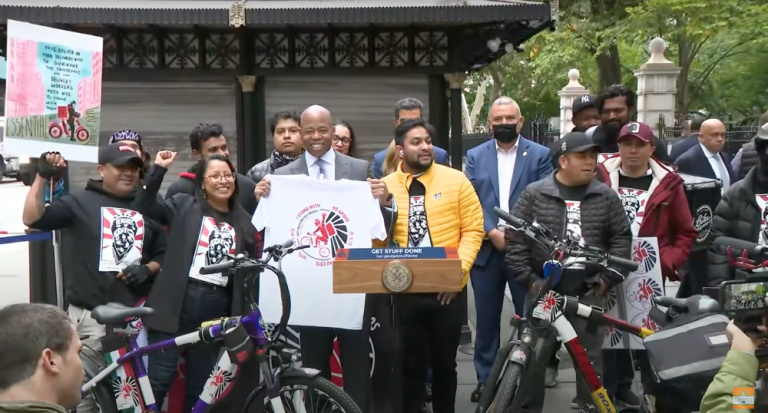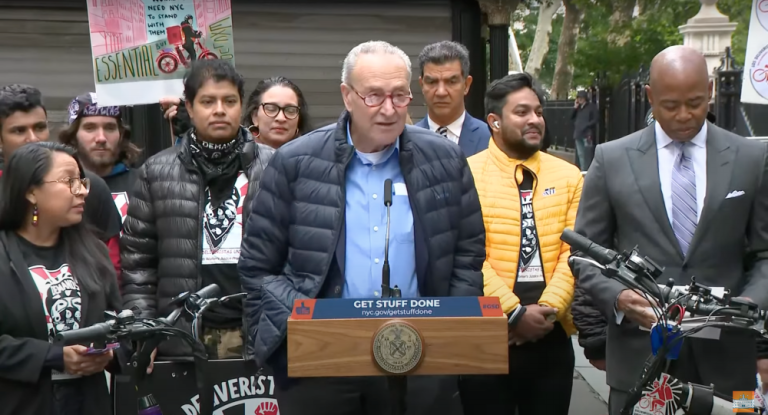‘Hubs,’ A Haven For Delivery Workers
The new program — which will create refuge for deliveristas — is among the latest developments in a bid for increased safety


Wearing a light puffy jacket on Monday, in the midst of the season’s first days-long stretch of heavy skies and chilly temps, U.S. Senate Majority Leader Chuck Schumer joined Mayor Eric Adams to announce a new win for delivery workers in the city. “Street Deliveristas Hubs,” as they’ve been dubbed, will provide refuge from rain and eventually snow — plus a place to refuel electric bikes, phones and spirits.
“When I rode my bike alongside deliveristas last fall,” Schumer said in a statement, “I pledged to fight for better infrastructure to support their needs, including charging stations, shelter, rest areas, and more.”
He recently secured $1 million in federal grant money for Workers Justice Project/Los Deliveristas Unidos, to transform existing but unused infrastructure, like newsstands, in the next few months. The new hubs will serve over 65,000 app-based delivery workers in the city, according to Adams — a project that falls in line with a larger bid for safer streets.
Up For The Job
During the pandemic, deliveristas joined the front lines to keep the city alive, in their own way. “I saw it first hand, during COVID,” Adams said, announcing the funding win. “They did not shelter in place, they could not do their jobs remotely. They were on the ground, delivering food to you.” The new program is a multiagency one, involving the Department of Parks and Recreation and the Department of Transportation, while also catching the attention of the Department of Consumer and Worker Protection and the Office of Immigrant Affairs.
Pandemic or not, the job is demanding. “Food delivery workers serve our city in rain, snow, and extreme heat,” said Vilda Vera Mayuga, commissioner of the Department of Consumer and Worker Protection, in a statement.
Now, the Street Deliveristas Hubs pilot program will become the first of its kind nationwide, according to Adams. The rest stations will be designed with input from delivery workers and the neighborhoods they serve, and will be located in high-traffic areas. An additional benefit will be their ability to help clear the streets and sidewalks for pedestrians, advocates say.
“The Streets Are Overcrowded”
The city’s streets continue to be dangerous for pedestrians, cyclists and drivers, even after an initial respite from the most severe incidents — deaths caused by traffic crashes — following the 2014 adoption of a Vision Zero plan to curb injuries and fatalities. Traffic-related deaths increased every year since 2018, reaching 272 in 2021, city data shows. Injuries also trended upward after the start of the program, with the number only dipping below 51,000 — the approximate amount of traffic injuries reported the year Vision Zero was first launched — in 2020 and 2021.
At the outset of this year, Adams promised a renewed effort to address the problem. Other politicians, like Council Members Gale Brewer and Julie Menin, have taken up a fight against grocery delivery companies like Gopuff and Gorillas, in part due to speedy delivery times that some say are hazardous to delivery workers and pedestrians alike.
Menin now envisions the new Street Deliveristas Hubs program working in tandem with her own efforts. “The battle that I have been waging against 15-minute delivery apps has to do with worker safety and pedestrian safety,” she told Our Town. The companies, she said, “are endangering workers by insisting that groceries and other goods have to be delivered in 15 minutes. The very nature of that claim puts the delivery worker in jeopardy.”
The hubs, Menin believes, will also help streamline the streetscape. “Right now, the streets are overcrowded,” she said. “If we have vacant and dilapidated public infrastructure that’s simply not being utilized, we should activate and utilize it.” In her own Upper East Side district, she’d welcome the program.
The program will also fund renovations of a “worker center” in Williamsburg, plus “worker-led training programs” and dissemination of “workers’ rights information,” according to Ligia Guallpa, the executive director of Workers Justice Project/Los Deliveristas Unidos.
Learning Legislation
Another educational push is coming in the form of legislation that calls for a FDNY “informational campaign” regarding the potential fire-related dangers associated with lithium-ion batteries used in “powered mobility devices,” introduced in the City Council by Brewer, with Council Members Alexa Aviles and Jennifer Gutierrez.
Brewer has also co-sponsored, with Council Member Oswald Feliz, a bill that would ban the sale of any electric bicycle or scooter batteries that aren’t “listed and labeled by a nationally recognized testing laboratory or other approved organization.” Delivery workers go through a large volume of batteries at a rapid pace, she told Our Town, describing the use of second-hand batteries or those with unclear origins as a high-stakes gamble.
“I want them to be safe and I want the public to be safe,” she said. “It’s a tall order, because it’s a brand new industry.” One charging and rest station will be opened in Brewer’s Upper West Side district, according to the Council member, as part of the new Street Deliveristas Hubs pilot. “They want to charge at their place of work, not at home,” she said.
Supporters of the program are hopeful the job can become a more equitable one. “Delivery workers keep New York City fed,” DOT Commissioner Ydanis Rodriguez said in a statement. “They are a vital part of the city’s economy, and they deserve safe, welcoming work environments, just like any other workforce.”
“Food delivery workers serve our city in rain, snow, and extreme heat.” Vilda Vera Mayuga, Commissioner of the Department of Consumer and Worker Protection